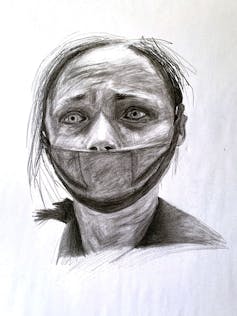Campus Free Speech, Online?

Professors fiercely champion free speech. Many believe that unfiltered, even offensive, expression is fundamental to post-secondary academic life. But what about their students? Should student social media posts be punishable, even if they are made off-campus?
This emerging issue in the perpetual battle over free expression speaks to the perils of ever-present devices, ubiquitous wi-fi and instantaneous communication. Given Bill C-10’s potential impact on Canadian online speech, such as the Canadian Radio-television and Telecommunications Commission (CRTC) potentially regulating content we view on social media, defining the contours of online expression is important.
This issue also relates to rapidly shifting demographics at Canadian post-secondary institutions. Namely, the difficulty in adjudicating diverse speech by even more diverse students.
Racialized students account for 40 percent of undergraduates and graduates at Canadian universities. Weighing unrestricted expression via dynamic technologies against fostering a tolerant public sphere will test the fundamental freedoms we cherish in our democratic society.
The case of a pharmacy student
Kimberly Diei is a graduate student at the University of Tennessee studying at the pharmacy school. Earlier this year, the university received anonymous complaints about her social media activity – more than 17 Instagram posts and tweets (all made under a pseudonym) – including rap lyrics she wrote based on Cardi B and Megan Thee Stallion hit song WAP.
University of Tennessee administrators later expelled her for “crude” and “vulgar” posts. Diei appealed and her expulsion was reversed. She then filed a lawsuit alleging that the University of Tennessee violated her freedom of expression without valid educational purposes.

Evolving online communication practices raise important issues:
- What are the limits of student speech?
- How should institutions judge incendiary social media posts?
- Can we prevent problems similar to Diei’s from recurring?
Tinker tailors speech: The disruption test
Tinker v. Des Moines remains the iconic student expression case. The case involved young activists who wore black armbands to school to protest the Vietnam War. Administrators expelled the students until they removed this “offensive” clothing. The students fought back.
In response, U.S. Supreme Court Justice Abraham Fortas wrote that students do not “shed their constitutional rights to freedom of speech or freedom of expression at the schoolhouse gate,” guaranteeing student speech constitutional protection in America.
The Tinker standard became determinative. Expression was protected as long as it did not disrupt education.
Subsequent cases refined Tinker’s broad speech protection. Bethel prohibited sexually vulgar speech made during a school assembly. Hazelwood School District vs. Kuhlmeier granted a school editorial control over sponsored activities like student newspapers. Morse v. Frederick permitted a school to restrict speech promoting drug use. Mahanoy Area School District v. B.L. involves a cheerleader who was suspended for posting expletives on Snapchat (she had expressed frustration over not making her high school cheerleading squad). This case is currently being decided by the U.S. Supreme Court. Substantial disruption remains the standard.
Canada has no formal case law equivalent to Tinker, so student online expression rules tend to vary depending on campus policies. For example, the University of Toronto Mississauga suggests that faculty, staff and students who post to institutional accounts follow the Golden Rule in guiding their posts, among other prudent recommendations.
Although Diei’s dilemma was not decided at trial, University of Tennessee administrators applied the Tinker standard. Anonymous student complaints show that she unsettled members of her learning community. However, Diei’s posts did not appear to meet existing disruption thresholds to justifiably limit her speech. This seems appropriate given the coarse nature of daily online discourse.

“Freedom of thought, belief, opinion and expression” are enshrined in the Canadian Charter of Rights and Freedoms, subject to “reasonable limits.” As such, Canadian post-secondary institutions could follow Tinker’s disruption standard to judge whether student speech should be reasonably limited.
Despite her vindication, Diei’s struggles speak to another issue. The role post-secondary institutions should play in policing student communications.
Shifting communication tools – Online identity exploration
Many people support opening up academic spaces to new people. However, public-facing digital communication tools surface a new source of tension.
Academic spaces are used to accommodating a relatively finite amount of private expression, like traditional face-to-face interactions in classrooms. Now they are trying to keep up with a much higher volume of online speech occurring in an ever expanding number of virtual spaces via social media platforms.
In short, slow-paced post-secondary institutions with long histories in the physical world have difficulty responding to incredibly fast-paced student social media posts in the virtual world. And the university’s faculty may not realize that these online spaces are fundamental for youth identity exploration that may inadvertently violate inflexible communication norms of the institution.
Diei’s difficulties speak to the need for these formal places to become responsive to shifting technological mores. They should also welcome novel forms of informal expression that push against traditional forms of communication.
Letting kids be kids? – Understanding professional speech
Many professors likely believe that discussing social media is beyond the scope of the classroom. Why should the average lecturer spend valuable time speaking about student posts when they are busy teaching?
Diei expressed confusion about what she could express online. Younger students may be even more perplexed about how their expression potentially breaches institutional communication standards.
Given the internet’s infinite memory, we should proactively discuss online speech across all levels of education. Otherwise, students could be increasingly penalized as communication becomes further disjointed. Languages intermingle and social media organically creates unique new idioms that are different from traditional academic and professional speech.
Youth must understand how their informal expression conflicts with the professional environments they are entering. Unless we discuss how traditional communities communicate, and even challenge their unforgiving standards, our students could face career difficulties that may only worsen while they are under our educational care and beyond.




























































































